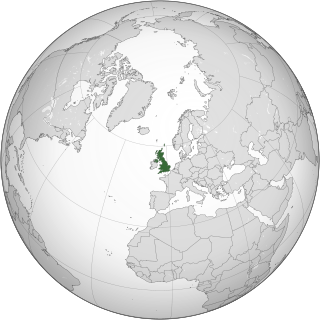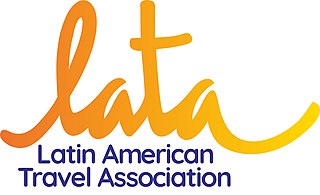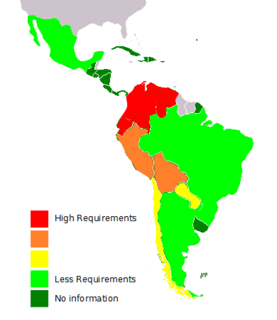 W
WLatin America is a group of countries and dependencies in the Western Hemisphere where Romance languages such as Spanish, Portuguese, and French are predominantly spoken. Some subnational regions such as Quebec and parts of the United States where Romance languages are primarily spoken are not usually included due to the countries as a whole being a part of Anglo America. The term is broader than categories such as Hispanic America, which specifically refers to Spanish-speaking countries and Ibero-America, which specifically refers to both Spanish and Portuguese-speaking countries. The term is also more recent in origin.
 W
WAgroecology is an applied science that involves the adaptation of ecological concepts to the structure, performance, and management of sustainable agroecosystems. In Latin America, agroecological practices have a long history and vary between regions but share three main approaches or levels: plot scale, farm scale, and food system scale. Agroecology in Latin American countries can be used as a tool for providing both ecological, economic, and social benefits to the communities that practice it, as well as maintaining high biodiversity and providing refuges for flora and fauna in these countries. Due to its broad scope and versatility, it is often referred to as "a science, a movement, a practice."
 W
WList of reported attacks and species involved in Latin America.
 W
WA balneario is an Iberian and Latin American resort town, typically a seaside resort, and less commonly along the shores of lakes and rivers or next to hot springs. In Spain, balneario typically only refers to spa town resorts. Whatever the case, these resorts offer recreation, sports, entertainment, food, hospitality and safety services, retail, and cultural events. These balneario towns are characterized by being flooded by masses of tourists during the summer seasons.
 W
WThe Bolivarian countries are six Hispanic American countries whose republican origin is attributed to the ideals of Simón Bolívar and independence war led by the Venezuelan military in the viceroyalties of New Granada and Peru.
 W
WBye Bye Havana is a 2005 fast-paced stream of consciousness documentary that presents a vibrant portrayal of Cuban life. The film juxtaposes commercialism with vintage anti-communist propaganda and the elementary difficulties that everyday Cubans face. Directed by J. Michael Seyfert the film was shot and edited in Cuba over the course of 2 years. For its enduring images, Carlos Alberto Montaner of Foreign Policy calls Seyfert's film "A colorful and sobering picture of the Cuba that Fidel has left behind".
 W
WCanada–Latin America relations are relations between Canada and the countries of Latin America. This includes the bilateral ties between Canada and the individual Latin American states, plurilateral ties between Canada and any group of those states, or multilateral relations through groups like the Organization of American States (OAS).
 W
WChina–Latin America relations are relations between the People's Republic of China and the countries of Latin America. Such relations have become increasingly important.
 W
WCrime and violence affect the lives of millions of people in Latin America. Some consider social inequality to be a major contributing factor to levels of violence in Latin America, where the state fails to prevent crime and organized crime takes over State control in areas where the State is unable to assist the society such as in impoverished communities. In the years following the transitions from authoritarianism to democracy, crime and violence have become major problems in Latin America. The region experienced more than 2.5 million murders between 2000 and 2017. Several studies indicated the existence of an epidemic in the region; the Pan American Health Organization called violence in Latin America "the social pandemic of the 20th century." Apart from the direct human cost, the rise in crime and violence has imposed significant social costs and has made much more difficult the processes of economic and social development, democratic consolidation and regional integration in the Americas.
 W
WThe term French West Indies or French Antilles refers to the eight territories currently under French sovereignty in the Antilles islands of the Caribbean:The two overseas departments of: Guadeloupe, including the islands of Basse-Terre, Grande-Terre, Les Saintes, Marie-Galante, and La Désirade. Martinique The two overseas collectivities of: Saint Martin Saint Barthélemy
 W
WHispanic America is the portion of the Americas comprising the Spanish-speaking countries of North, Central, and South America. In all of these countries, Spanish is the main language, sometimes sharing official status with one or more indigenous languages, or English and Roman Catholicism is the predominant religion.
 W
WThe illegal drug trade in Latin America concerns primarily the production and sale of cocaine and cannabis, including the export of these banned substances to the United States and Europe. The Coca cultivation is concentrated in the Andes of South America, particularly in Colombia, Peru and Bolivia; this is the world's only source region for coca.
 W
WThe Italy–Latin America Conference or Italo–Latin America Conference, formally the Italy–Latin America and Caribbean Conference, is an inter-governmental forum for encounter between Italy and the countries of Latin America. A biennial summit is organised in Italy by the "Italo-Latin American Institute" located in Rome, with many initiatives marking the "preparatory path". The institute's aims are to develop and coordinate research and documentation regarding the problems, achievements and prospects of its Member Countries in cultural, scientific, economic, technical and social contexts. The conferences are an effective and well-established foreign policy instrument in Italy’s relations with the countries of Latin America and the Caribbean.
 W
WJapan–Latin America relations are relations between Japan and the countries of Latin America. Relations span a period not later than the 19th century to the present.
 W
WThe term Latin America and the Caribbean (LAC) is an English-language acronym referring to the Caribbean and Latin American region. The term LAC covers an extensive region, extending from The Bahamas and Mexico to Argentina and Chile. The region has over 670,230,000 people as of 2016, and spanned for 21,951,000 square kilometres (8,475,000 sq mi).
 W
WLatin America–United Kingdom relations are relations between the United Kingdom of Great Britain and Northern Ireland and the countries of Latin America.
 W
WLatin America–United States relations are relations between the United States of America and the countries of Latin America. Historically speaking, bilateral relations between the United States and the various countries of Latin America have been multifaceted and complex, at times defined by strong regional cooperation and at others filled with economic and political tension and rivalry. Although relations between the U.S. government and most of Latin America were limited prior to the late 1800s, for most of the past century, the United States has unofficially regarded parts of Latin America as within its sphere of influence, and for much of the Cold War (1947–1991), actively vied with the Soviet Union for influence in the Western Hemisphere.
 W
WLatin America as a region has multiple nation-states, with varying levels of economic complexity. The Latin American economy is an export-based economy consisting of individual countries in the geographical regions of North America, Central America, South America, and the Caribbean. The socioeconomic patterns of what is now called Latin America were set in the colonial era when the region was controlled by the Spanish and Portuguese empires. Up until independence in the early nineteenth century, colonial Latin American regional economies thrived and worked things out. Many parts of the region had favorable factor endowments of deposits of precious metals, mainly silver, or tropical climatic conditions and locations near coasts that allowed for the development of cane sugar plantations. In the nineteenth century following independence, many economies of Latin America declined. In the late nineteenth century, much of Latin America was integrated into the world economy as an exporter of commodities. Foreign capital investment, construction of infrastructure, such as railroads, growth in the labor sector with immigration from abroad, strengthening of institutions, and expansion of education aided industrial growth and economic expansion. A number of regions have thriving economies, but "poverty and inequality have been deeply rooted in Latin American societies since the early colonial era."
 W
WThe Latin American Integration Association / Asociación Latinoamericana de Integración / Associação Latino-Americana de Integração is an international and regional scope organization. It was created on 12 August 1980 by the 1980 Montevideo Treaty, replacing the Latin American Free Trade Association (LAFTA/ALALC). Currently, it has 13 member countries, and any of the Latin American States may apply for accession.
 W
WThe Latin American Travel Association (LATA) is a UK travel industry association whose purpose is to promote travel to Latin American destinations.
 W
WThe Latin Union was an international organization of nations that used Romance languages that existed as a functional institution from 1983 to 2012. Headquartered in Paris, France, its aim was to protect, project, and promote the common cultural heritage of Latin peoples and unifying identities of the Latin, and Latin-influenced, world. It was created in 1954 in Madrid, Spain, and its membership rose from 12 to 36 states, including countries in North America, South America, Europe, Africa, and the Asia-Pacific region.
 W
WA Caudillo is part of the larger Iberian tradition of authoritarian leaders, with roots in the Iberian past, particularly in the Reconquista. A number of military leaders who were part of the Spanish American struggle for independence took on political roles in during the establishment of new sovereign nation-states. The establishment of military strong men as the head of new national governments did not generally come via elections, but many did have strong popular support. Caudillos often have a personalist connection with their popular followers, combining charisma and machismo ("manliness"), access to political and economic power. They often desire to legitimize their rule. Many caudillos brought order to their areas of control, but also resorted to violence with their armed supporters to achieve it. The early nineteenth century has been considered the "Age of Caudillos," but authoritarian regimes existed in the twentieth century as well, with caudillismo casting a long shadow.
 W
WThe Patria Grande is the concept of a shared homeland or community encompassing all of Spanish America, and sometimes all of Latin America and the Caribbean. The term is associated with political ideas of Ibero-American integration, rejecting the balkanization of the Spanish Empire in the Americas that followed the Spanish American wars of independence. The term may be also used to talk specifically about projects of Hispanic American unity held by Simón Bolívar and José de San Martín.
 W
WPGA Tour Latinoamérica is a third level professional golf tour formed in 2012 and operated by the PGA Tour. It was formed in concert with the now defunct Tour de las Américas. Executives from the Tour de las Américas became employees of the new tour. The initial 2012 season runs from September to December and consists of 11 tournaments in seven Latin American countries. Subsequent years' schedules will run in two swings, March to May and October to December (spring).
 W
WThe Spanish West Indies or the Spanish Antilles were Spanish colonies in the Caribbean. In terms of governance of the Spanish Empire, The Indies was the designation for all its overseas territories and was overseen by the Council of the Indies, founded in 1524 and based in Spain. When the crown established the Viceroyalty of New Spain in 1535, the islands of the Caribbean came under its jurisdiction.
 W
WThe Washington Office on Latin America (WOLA) is a United States non-governmental organization (NGO) whose stated goal is to promote human rights, democracy, and social and economic justice in Latin America and the Caribbean.
 W
WWastewater discharge standards protect water sources from pollution and mismanagement. Each country in Latin America has its own set of standards, and these vary according to types of water use, agricultural, industrial or recreational use. Water quality is maintained by controlling the physicochemical and bacteriological parameters. The majority of water laws include fines for noncompliance. In many cases fines are inadequate and do not stop offending. In other cases the standards are lax and monitoring is sub-par.
 W
WWater supply and sanitation in Latin America is characterized by insufficient access and in many cases by poor service quality, with detrimental impacts on public health. Water and sanitation services are provided by a vast array of mostly local service providers under an often fragmented policy and regulatory framework. Financing of water and sanitation remains a serious challenge.
 W
WWealth inequality in Latin America and the Caribbean refers to economic discrepancies among people of the region. Wealth inequality remains a serious issue despite strong economic growth and improved social indicators observed over the past decade. A report release in 2013 by the UN Department of Economic and Social Affairs entitled Inequality Matters. Report of the World Social Situation, observed that: ‘Declines in the wage share have been attributed to the impact of labour-saving technological change and to a general weakening of labour market regulations and institutions. Such declines are likely to affect individuals in the middle and bottom of the income distribution disproportionately, since they rely mostly on labour income.’ In addition, the report noted that ‘highly-unequal land distribution has created social and political tensions and is a source of economic inefficiency, as small landholders frequently lack access to credit and other resources to increase productivity, while big owners may not have had enough incentive to do so.
 W
WWilliam J. Perry Center for Hemispheric Defense Studies is a U.S. Department of Defense institution for defense and security studies in the Western Hemisphere. Through courses, seminars, outreach, strategic dialogue, and focused research in support of policy objectives, the Perry Center works with senior civilian and military officials from the Americas to build strong, sustainable networks of security and defense leaders and institutions. In so doing, the Perry Center is supposed to promote greater understanding of U.S. policy, mutually supportive approaches to security challenges, and improved, sustainable institutional capacity." On April 12, 2018, AllGov.com reported that: "In 2015 CHDS was credibly accused in an internal Army report of shielding a teacher from Chile who belonged to a known state terrorist organization; clandestine involvement of Center officials in the 2009 Honduran coup; and gross mismanagement, corruption, homophobia, racism, and sexism."
 W
WThe World Bike Forum is a yearly cycling activism event in which the topics of bicycle urban mobility and the planning of cities made by and for the people are discussed.